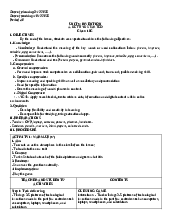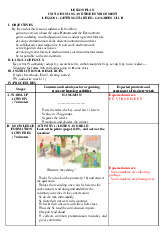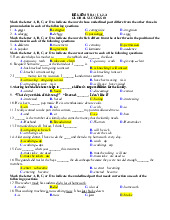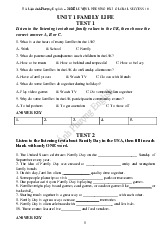



















Preview text:
Unit 1 Tourist Information Section 1 Language Focus Vocabulary
1. Work in pairs. Match the words to the correct pictures. a. Tourist Attractions a. Floating market d. Waterfall g. Market b. Jungle e. Grotto h. Pagoda c. Bay f. Bird sanctuary i. Beach 1.___________ 2.___________ 3.___________ 4.___________ 5.___________ 6.___________ 7.___________ 8.___________ 9.___________ English for Tourism page 1 b. Tourist Activities a. Fishing g. Skating b. Swimming h. Hiking c. Bird watching i. Horse riding d. Kayaking j. Playing golf e. Scuba diving k. Sailing f. Skiing l. Biking 1. ___________ 2. ___________ 3. ___________ 4. ___________ 5.___________ 6. ___________ 7. ___________ 8. ___________ 9. ___________ 10. ___________ 11. ___________ 12. ___________
2. Listen to some tourists telephoning a tourist information center in Sydney. What are
they looking for? Complete the table.
a. Somewhere to relax, swim and sunbathe b. Panoramic view of the city
c. Battleships and historic ships
d. Somewhere educational, interesting museum
Enquirer What the enquirer is looking for 1 2 3 4 English for Tourism page 2 Compound nouns
In English we can use nouns as adjectives. For example: Water sport Stork sanctuary Adventure tour
The relationship between the two nouns can be of many kinds, including: Place: mountain slopes, city center Time: summer holiday, weekend break Function: golf course, swimming pool Material:
paper bag, iron bridge, stone cathedral Practice
1. Match the nouns in A and B. A B Theme City Tour Sports Shopping Trip Boat Park Water Guide Capital Mall
2. Rewrite these sentences without changing the meaning.
Ex: - It takes five minutes to walk from the hotel to the beach.
- It’s a five-minute walk from the hotel to the beach.
a. It takes two hours o drive to the airport.
………………………………………………………………………………………
b. You can visit the sanctuary which extends to over 4 hectares in Thot Not, Can Tho.
………………………………………………………………………………………
c. We stayed in a hotel with three stars.
………………………………………………………………………………………
d. The journey to Cai Rang floating market takes 3 hours.
……………………………………………………………………………………… Advice and suggestions
We can give advice to someone by using the following structures.
• If you’re looking for …….., then go to ……… • Don’t miss ………
• …….. is a must for any visitors to ……..(city).
• You can’t leave ….. (city) without …… Practice
Pairwork: Student A: You have 2 days off work. You want to go somewhere
relaxing this weekend. Go to a tourist information center to ask for some information for your trip.
Student B: A customer comes and asks you some information for his/her trip. Give
him/her some suggestions about where to go and what to do. English for Tourism page 3 Section 2 Reading 1. Pre-reading
a. Where did you spend your last vacation? What did you do there? Which places did you visit?
b. Where did you get information about that trip? (From your relatives? Friends? Coworkers? Internet?)
c. Do you feel satisfied with the information you got? Why? 2. Reading
TOURIST INFORMATION OFFICES
The tourism department operates tourism information offices in many origin
countries. A tourism information office promotes, or builds, travel to a destination
country through advertising and special promotional activities. For example,
representatives of the information office give
brochures about vacations, the
destination country, and special tours to travel agents in the origin country. A brochure
is a printed folder, or pamphlet, about a place, product, or company. Brochures
advertising tourism are written, printed, and supplied to information offices in origin
countries by the tourism department.
Mr. Carter is the director (manager) of a tourism information office. He has a
large staff. A staff in a business office is a group of people who work together. The
staff includes people who work directly with travel agents; others who do work with
companies and businesses; people who contact newspapers and television and radio
stations; some who work with airlines and hotels; people who write advertising; and
information clerks and secretaries.
One of Mr. Carter's most important jobs is that of public relations director. The
purpose of this job is to establish a good attitude toward his country among the public
(people) of the origin country. As part of this job, he supervises the writing and
distribution of press releases (news stories) for the media. Media refers to all the ways
of spreading information, such as newspapers, radio, television, and other means of
communication. Media is a plural word, meaning it refers to all these means. Radio is
a medium of communication; it is one of the media used for advertising. Public
relations people place special news stories in the media to help build interest in the
destination country. Advertisements in the media, paid for by the tourism department, also help establish interest.
Employees in public relations and advertising must be fluent in English if they
work in English-speaking countries. "To be fluent" means to speak, read, and write a
language almost as well as the natives do. Mr. Carter's staff members write
advertisements, news releases, and brochures to promote travel to their country. They
give lectures (talks) and show films about their country to groups of people. They
answer questions about travel to their country. English for Tourism page 4
Mr. Carter holds press conferences whenever something of importance or
interest happens in his country. A press conference is a meeting attended by reporters
from newspapers, magazines, radio, or television. At a press conference, someone
makes announcements that their readers, listeners, or viewers might find interesting.
Whenever an important person from his country visits, Mr. Carter holds a press
conference to introduce that person to the representatives of the media. Such news
items help to build interest in and knowledge about his country.
Information offices also give tourists and immigrants helpful information. The
clerks give them any necessary documents or visas that may be required for entrance.
The staff can also tell them about different laws and regulations in the destination country.
Mr. Carter and his staff also work with businesses and industries that might be
interested in either moving to or doing business with the destination country. Mr.
Carter's country wants foreign industries to come and help build industry there. The
country is also interested in exporting some of its products. In turn, the country is
anxious to get the best prices on products imported from other countries.
Wherever they go and whatever they do, the information staff members
represent their country. "We are the face of our country to the rest of the world," Mr.
Carter says. "Before they know anything about our country, people form their
impressions and attitudes about it from the things we do and say."
(Adapted from English for the Travel Industry
by Benedict Kruse and Bettijune Kruse,1982)
Answer the following questions.
a. What does a tourism information office do to promote travel to the destination country?
b. Why is the job of public relations important?
c. What are some of the duties of public relations people?
d. How well do employees who work in English-speaking countries have to know English? English for Tourism page 5 3. Vocabulary
Choose the correct word or phrase to complete each sentence.
1. The country from which the tourist comes is called the _______ country. a. destination c. vacation b. origin d. native
2. A _______ office promotes travel to the destination country. a. representative c. travel agent b. tour packager d. tourisminformation
3. A _______ is a printed pamphlet about a place, product, or company that is used for advertising. a. media c. visa b. passport d. brochure
4. The purpose of public relations is to establish a good _______toward something among the public. a. advertisement c. attitude b. interest d. contact
5. Newspapers, magazines, and books are print _______ that spread information. a. medium c. brochures b. media d. advertisements 4. Speaking
Choose a tourist destination in Vietnam which you
know well. In groups of four or five students, prepare
a presentation about tourist attractions and activities in that place. English for Tourism page 6 Section 3 DO YOU REMEMBER?
1. What are some famous places and activities for tourists in the Mekong Delta?
...........................................................................................................................................
...........................................................................................................................................
...........................................................................................................................................
...........................................................................................................................................
...........................................................................................................................................
...........................................................................................................................................
2. If you want to give some suggestions, what can you say?
...........................................................................................................................................
...........................................................................................................................................
...........................................................................................................................................
...........................................................................................................................................
...........................................................................................................................................
........................................................................................................................................... English for Tourism page 7 Unit 2 Tour Itineraries Section 1 Language focus
Referring to the future
When referring to the future itinerary, we can use a wide range of tenses.
• The present simple can be used for a program or regular schedule which is unlikely to change.
• WILL can be used to make a deduction, a factual prediction or a spontaneous offer.
• GOING TO can be used to predict future events based on a present evaluation of circumstances. Practice
1. Work in pairs, one as a travel agent, the other as a tourist. Ask and answer questions
about this day trip from London to Oxford. 08.15
Coach departs from London, Victoria. 10.00 Arrival in Oxford. 10.15
Tour of Oxford University colleges. 12.45 Lunch at the Turf Tavern. 14.00 Coach leaves for Woodstock. 14.30
Tour of Woodstock and Blenheim Palace. 17.30 Coach departs for London. English for Tourism page 8
2. Listen to the travel agent explaining the tour from Bangkok to Malaysia and complete this tour itinerary. Day 1 Arrival in Bangkok
You arrive in Bangkok and transfer to your hotel. Day 2 Bangkok
You are free to 1………………… in your hotel or 2………………… the city. Day 3 Bangkok
After visiting the 3………………… in the morning, we spend the afternoon touring
the Grand Palace and watching the display of Thai 4………………… In the evening,
we take the overnight 5………………… to Nakorn Sri Thammarat. Day 4
Nakorn Sri Thammarat Krabi
On arrival, we visit the 7th century 6………………… and the museum, before going
on to see the famous 7………………… at work. After lunch we drive to Krabi on the 8………………… coast. Day 5 Krabi / Phuket
After 9………………… the night in Krabi, we set off early for Phuket. The rest of the
day is yours to enjoy on Thailand’s 10………………… island. Day 6 Phuket / Penang
We take the early flight to Penang for the 11………………… part of the tour. You
are free to explore the 12………………… and mosques of Penang, or relax on the 13………………….
(Adapted from a listening exercise in First Class, 1991) English for Tourism page 9 Section 2 Reading 1. Pre-reading
a. What means of transport do you like for a short journey? for a long journey? Why?
b. What are some of the most popular means of transport available in Can Tho that tourists can use? 2. Reading
THAILAND, CAMBODIA AND LAOS 16 DAYS
The trip: An Exciting journey through the
festinating kingdoms of Cambodia and Laos by
boat, train, and bus. A busy trip, but with lots of
time for shopping, relaxing and exploring.
Size of group: 5-15 plus group leader and local guide
Accommodation: 11 nights in hotels, 2 nights in local houses ITINERARY Day 1 Depart Heathrow Airport Day 10
Free day to wander around peaceful Vang
Vieng, or take a walk and explore the Day 2 Arrive Bangkok
spectacular limestone caves or the Day 3
Visit the Grand Palace, the take train to surrounding hills. Aranyaprathet. Day 11
Drive to Luang Prabang, a world heritage Day 4
Cross the border by train to the old town sight.
of Battambang in Camodia; explore in Day 12
Early morning climb of Mount Phousi to see the afternoon.
the sunrise; rest of the day free to visit the Day 5
Take boat down river to Tonle Sap, then waterfalls or simply relax.
a short bus journey to Siem Reap; Day 13
Speedboat trip to Pak Beng, stopping off at
afternoon sightseeing in Banteay Srei. the Pak Ou caves. Day 6
A day to explore the amazing temples of Day 14
Another boat trip to the border town Huay
Angkor, including the Bayon, Angkor
Xai and cross the Mekong back into
Wat, Angkor Thom, and countless others. Thailand. Day 7 Day 15
Fly to Bangkok in the morning. Night flight
Early morning boat ride to Phnom Penh; to London.
afternoon visiting the Royal Palace and Silver Pagoda. Day 16 Arrive Heathrow Airport. Day 8
Fly to Vientiane, the capital of Laos. Day 9
Morning tour of Vientiane; afternoon bus
journey to Vang Vieng past rice paddies and through dense forests. English for Tourism page 10
Find out where you can: a. See many ancient temples __________________________
b. Cross the border from Laos to __________________________ Thailand c. Visit caves (two places) __________________________ d. See the sunrise __________________________ e. Visit the Silver Pagoda __________________________
f. Cross the border from Thailand __________________________ to Laos
3. Writing and Speaking
Write an itinerary for a 4-day tour in the Mekong Delta. Then, explain your tour itinerary to the whole class.
EXLORING THE MEKONG DELTA Tour code: MK-A03 Duration: 4 days
Discovering the Mekong Delta is an unforgettable experience for you. Paddy fields,
orchards and small hamlets will be in your view along your way down the Mekong Delta. Come and join us. Day 1 Day 2 Day 3 Day 4 English for Tourism page 11 Section 3 DO YOU REMEMEBER?
Complete the following statements.
• The simple present can be used for:
...........................................................................................................................................
...........................................................................................................................................
........................................................................................................................................... • WILL can be used for:
...........................................................................................................................................
...........................................................................................................................................
...........................................................................................................................................
...........................................................................................................................................
...........................................................................................................................................
...........................................................................................................................................
• BE GOING TO can be used for:
...........................................................................................................................................
...........................................................................................................................................
...........................................................................................................................................
...........................................................................................................................................
...........................................................................................................................................
........................................................................................................................................... English for Tourism page 12 Unit 3 Tour Booking Section 1 Language Focus Taking booking
Here are some of the expressions the travel agent uses when taking the booking. Can I help you?
I’ll check availability on the 14th of November.
Do you want to confirm it?
Can I take some details?
I’ll just give you the booking reference number? Asking questions
In formal situations it is more polite to ask questions indirectly, especially at the
beginning of a conversation. For example, it can be better to use an indirect form such
as Could you tell me when you were born? rather than When were you born? Direct questions Indirect questions
What kind of tour would you like?
Can I know what kind of tour you’d like?
How many people is it for?
Can you tell me how many people it is for?
How long does the journey take?
Do you know how long the journey takes? PRACTICE 1. Listening
a. Discuss the following questions.
1. When you stay in a hotel, what kind of room do you prefer?
2. Do you like to have meals at the hotel or go to local restaurant when you’re on holiday? Why? English for Tourism page 13
b. Listen to a conversation between a travel agent and a customer. Complete this customer enquiry form. Real Holidays Ltd. Customer enquiry form Resort Playa Blanca Hotel Room single twin balcony sea view Meal plan self-catering B & B half-board full-board Airport From ______________ To ____________________ Departure on ________ Nov. Dep: 09.35 Arr: _______ Return on ___________ Dep: _____ Arr:________ Client name 1. 2. Contact phone number Booking reference
(Adapted from a listening exercise in Going International, 1998) c. Speaking
Student A is a travel agent. Student B is a customer. Role-play the following situation.
After you’ve finished, change roles and repeat the role plays.
Student A: Travel agent Student B: Customer
You will be given a list of the tours
You want to have for a vacation. Ask
with specific details. A customer will
for information about the tour you like
come and ask you about the tour which and book it.
he/she is interested in. Try to sell
him/her a tour. Then, take the booking. English for Tourism page 14 Section 2 READING 1. Pre-reading
Which of the following things is better for a tourist to explore Can Tho City, buying a
package tour or organizing a tour himself? 2. Reading LOCAL TOURS
Tours, or trips, to places within a city or country are known as local tours. Local
tours can be of two types. First, there are one-day trips around a city or area. Second,
there are local tours that can take from two days to a full week and can include an entire country.
Local tours are arranged by tour packagers. Sometimes the packager is also a
tour operator and provides the equipment and the guides for the tours. The packagers
make up the itinerary, which is the schedule or listing of the places to be visited, and
prepay (pay in advance) for any admission fees that may be charged. An admission fee
is the charge to enter a place. It is usually prepaid on tours. If the tourists will stay
overnight, the packager also arranges for hotel accommodations. Sometimes meals as
well are included in local tour packages.
Tourists can arrange for local tours in two ways. They can reserve space on
tours as part of a package they buy from their travel agent at home. In this case, all
reservations are made before the tourists leave their own country. The arrangements
are set before they arrive at the destination country.
The second way tourists can arrange for local tours is to have a travel agent
make arrangements once they get to the destination country. Some tourists like to
make plans and reservations for local tours after they have arrived and learned more
about what they might like to see. They prefer not to have every day of their vacation planned ahead.
(Adapted from English for the Travel Industry
by Benedict Kruse and Bettijune Kruse, 1982)
Answer the following questions
a. What are the two ways that tourists can arrange for local tours?
_____________________________________________________________________
_____________________________________________________________________
_____________________________________________________________________
b. Why do some tourists prefer to make local tour reservations after they arrive in the destination country?
_____________________________________________________________________
_____________________________________________________________________
_____________________________________________________________________ English for Tourism page 15 3. Vocabulary
Choose the correct word or phrase to complete each sentence.
1. One-day trips around a city and longer trips within one country are known as _______. a. package tours c. local tours b. vacation trips d. seeing sights
2. The schedule or listing of places to be visited is called the _______. a. route c. program b. itinerary d. guide
3. Some places, such as museums or historic homes, charge _______ for people to enter. a. tour fees c. operating fees b. admission fees d. city taxes
4. Such charges, as well as the cost of hotel accommodations and meals, are usually
_______ by the packager for local tours. a. listed c. prepaid b. taxed d. arranged 4. Speaking
Discuss the following questions in groups.
1. Where have you traveled during the past 5 years? Which holidays did you enjoy most?
2. What kinds of the following kinds of holidays do you like most? Adventure Culture Fly-drive Cruise Farmstay Package/beach English for Tourism page 16 Section 3 DO YOU REMEMBER?
What are some expressions that you can use to take tour booking?
...........................................................................................................................................
...........................................................................................................................................
...........................................................................................................................................
...........................................................................................................................................
...........................................................................................................................................
........................................................................................................................................... English for Tourism page 17 Unit 4 Tour Commentaries Section 1 Language Focus Guiding language Indicating position On your right is the beautiful ….. On your left is the magnificent …… In front of you is We are now passing You can now see Superlatives …… is one of the finest buildings in the world. most famous sights in Asia. most beautiful in Vietnam. Passives ….. was built by …(person). …… was painted in … (date) …… was designed …. is said to be haunted be the best example of ….. have lived here. Present perfect ……... has stood here for ... (time period) has been standing since …(date). PRACTICE
1. Use the following notes to write into full sentences about St Paul’s Cathedral in London.
a. On/left/beautiful/St Paul’s Cathedral.
……………………………………………………………………………. b. Stood/over 300 years.
……………………………………………………………………………. c. Designed/Christopher Wren.
……………………………………………………………………………. d. One/large/dome/world.
…………………………………………………………………………….
e. Said/influenced/design/Capitol building/Washington.
……………………………………………………………………………. f. Lord Nelson/buried/crypt.
……………………………………………………………………………. 2. Quiz English for Tourism page 18
Work with a partner and do the following quiz.
1. The Parthenon was dedicated to ________ A. God Poseidon
B. Goddess Athena C. Both A. and B. D. None of these
2. The Parthenon was built almost 2,500 years ago in the country of ________. A. Greece B. Rome C. New York D. London
3. In which city is the Parthenon situated? A. Alexandria B. Athens C. Crete
4. How tall is the Eiffel tower? A. 1834 yards B. 1800 ft C. 1643 ft D. 984 ft
5. How long did it take to build this structure? A. 2 years and 2 months B. 3 years and 3 months C. 4 years and 4 months 6. St. Peter’s is a _____. A. church B. castle C. citadel
7. St. Peter’s was completed in ________ under Paul V. A. 1576 B. 1615 C. 1763 3. Listening
a. Listen to the guides giving commentaries at three places. Mark the statements T(True) or F(False).
(Adapted from a listening exercise in Going International, 1998) Commentary 1 a.......
The structure is 300 meters high. b.......
It was built in the 18th century. c.......
The British have a similar structure. Commentary 2 d.......
The guide is taking about a square. e.......
The church was built during 100 years. f.......
The tourists will climb up to see the city. Commentary 3 g.......
The building is 2000 years old. h.......
It was built as a Christian church. i....... It has been destroyed a lot. English for Tourism page 19
b. Listen again. In which commentary do you hear the following adjectives? Write the
numbers (1, 2, 3) on the line. a.............. Advanced b.............. Long c.............. Magnificent d.............. Proud e.............. Splendid f.............. Wonderful
c. What do the guides talk about? Write the number (1, 2 or 3) in the box. Parthenon Eiffel Tower St Peter’s English for Tourism page 20




